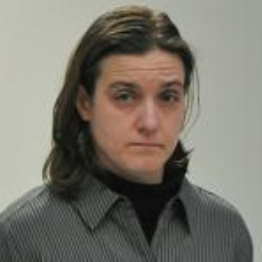The Massachusetts Supreme Judicial Court on Tuesday heard arguments over dismissing up to 11,000 more cases connected to the Amherst drug lab and potential punishments in the mishandling of the drug lab case, including the possibility of substantial fines for the attorney general's office.
May 11, 2018
2018 Associated press/file 2013 Former Amherst lab chemist Sonja Farak.
The Massachusetts Supreme Judicial Court on Tuesday heard arguments over dismissing up to 11,000 more cases connected to the Amherst drug lab and potential punishments in the mishandling of the drug lab case, including the possibility of substantial fines for the attorney general's office.
"This is the most significant record of harm as a consequence of prosecutorial misconduct that this court has ever seen," said Matt Segal, legal director for the American Civil Liberties Union of Massachusetts.
Chief Justice Ralph D. Gants, who called the Amherst drug lab scandal "a nightmare," grilled prosecutors on whether his court should take drastic steps to ensure misconduct of this magnitude never happens again.
The court expressed particular concern over how prosecutors investigated Sonja Farak, the former Amherst lab chemist arrested in January 2013 for stealing from the evidence locker. Gants said prosecutors working under former attorney general Martha Coakley showed a problematic "lack of curiosity" about the scope of Farak's crimes, and suggested prosecutors "put blinders on" despite having evidence Farak used drugs for more than a year prior to her arrest.
Associated press/file 2013 Former Amherst lab chemist Sonja Farak.
The Massachusetts Supreme Judicial Court on Tuesday heard arguments over dismissing up to 11,000 more cases connected to the Amherst drug lab and potential punishments in the mishandling of the drug lab case, including the possibility of substantial fines for the attorney general's office.
"This is the most significant record of harm as a consequence of prosecutorial misconduct that this court has ever seen," said Matt Segal, legal director for the American Civil Liberties Union of Massachusetts.
Chief Justice Ralph D. Gants, who called the Amherst drug lab scandal "a nightmare," grilled prosecutors on whether his court should take drastic steps to ensure misconduct of this magnitude never happens again.
The court expressed particular concern over how prosecutors investigated Sonja Farak, the former Amherst lab chemist arrested in January 2013 for stealing from the evidence locker. Gants said prosecutors working under former attorney general Martha Coakley showed a problematic "lack of curiosity" about the scope of Farak's crimes, and suggested prosecutors "put blinders on" despite having evidence Farak used drugs for more than a year prior to her arrest.
Get in your inbox: Forget yesterday's news. Get what you need today in this early-morning email.Two state prosecutors — Anne Kaczmarek and Kris Foster, both of whom now work in other government agencies — hid that evidence. And when defense attorneys unearthed it, prosecutors failed to flag the evidence for courts, including the SJC.
"In retrospect, we could have done things better," Assistant Attorney General Thomas Bocian conceded.
The state's 11 district attorneys have already agreed to dismiss more than 8,000 cases in which Farak analyzed samples of suspected narcotics during her nine years at the Amherst lab.
But defense advocates want the court to dismiss every case that passed through the Amherst lab during Farak's tenure.
Because Farak confessed to stealing from other chemists' samples and tampering with the lab's evidence tracking systems, public defender Rebecca Jacobstein of the Committee for Public Counsel Services argued the court must presume she tainted additional cases. But because prosecutors didn't test samples again, there's no way of telling which samples Farak tampered with and which she didn't, Jacobstein said.
Prosecutors disagree on whether the court should toss more cases. The district attorneys said the court should consider only cases in which Farak conducted the analysis herself, while Healey's office proposed dismissing all Amherst lab cases back to June 2012.
The attorney general's office suggested this time period based on Farak's testimony that she only started taking from co-workers' samples in summer 2012, Bocian told the court. Her labmates noticed declines in her productivity and appearance during this six-month period, according to grand jury testimony.
Some of the justices seemed skeptical of what Justice David A. Lowy called the "magic date" of June 2012.
Berkshire County Assistant District Attorney Joseph Pieropan, speaking on behalf of all the district attorneys, pointed to previous findings by a judge that Farak's colleagues' analysis should still be considered reliable. Pieropan also argued there was no evidence Farak falsely reported that samples contained narcotics, unlike former Hinton lab chemist Annie Dookhan.
"With Farak, we have questions about her reliability because of the nature of her addiction and, more importantly, because of the fact she was under the influence while testing," Pieropan said. "But nonetheless she was never motivated to turn negatives into positives."
Segal asked the court to impose monetary sanctions on the attorney general's office as a deterrent against future prosecutorial misconduct. Prosecutors said fines against the state were both unprecedented and unnecessary.
The referral of Kaczmarek and Foster to the state bar is adequate deterrent, Bocian said. Beyond possible disbarment, Pieropan said indictment could be appropriate for prosecutors who intentionally withhold evidence.
Gants said he had a "real dilemma" in considering not only whether to order sanctions, but if so, how steep.
"If we impose a sanction which you say is commensurate with the extent of the harm, it's a very large sanction," Gants told Segal. "If we do one which is purely symbolic, which is relatively small, are we viewed as understating the significance of the problem?"
Shawn Musgravecan be reached at shawnmusgrave@gmail.com. Reporting for this story was supported by the Fund for Investigative Journalism.


